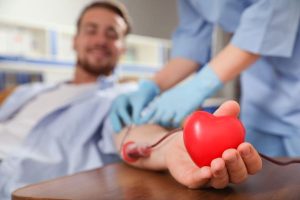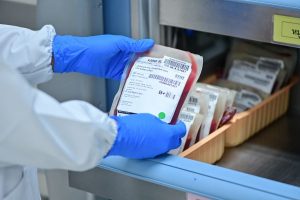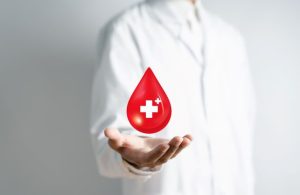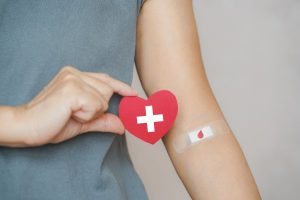The blood that flows through our veins is not only the key to our own health, but for the people around us, as well.
With the variety of health issues that require blood transfusions, you can change lives for the better.
That opportunity is more important now than ever with the current blood donation shortages we face. January is National Blood Donor Month, so if you have never donated blood before, now is the time to consider starting.
Here is everything you need to know about the importance of giving blood and how you can save a life by becoming a donor.

Key Takeaways
Keeping Our Blood Supply Stable
Your donation comes at a dire time as the U.S. currently faces a blood shortage due to a variety of factors, with organizations such as the American Red Cross declaring a national emergency in January 2024 that the number of U.S. blood donors has reached its lowest in 20 years.
Reasons for this drop range from long-term declines in donations to seasonal challenges. People are less likely to donate during the colder months due to harsh weather and the summer when they have less time due to vacations and other activities.
Hurricanes, heatwaves, and other severe weather events can make giving blood a challenge. The demand for Type O blood, both positive and negative, due to its use in emergency situations, has also seen a spike in recent years.
Someone in the U.S. needs blood and/or platelets every two seconds, and about 29,000 units of red blood cells are needed every day in the U.S. Approximately 5,000 units of platelets are needed in the U.S. each day.
Older donors are aging and approaching ineligibility to donate. This has led to a growing number of younger donors that will need to replace them.
Out of the approximately 37% to 62% of Americans that are eligible to donate blood, only 3% of them actually do. With your help, that percentage can see a rise.

Saving a Life
The main reason why you should consider becoming a blood donor is due to the lives you can help save in the process.
Blood loss from surgeries and injuries from traumatic accidents are among the many situations that require transfusions.
Your donation can also help patients suffering from cancer and other chronic illnesses. With the growing number of aggressive cancer treatments that need blood transfusions, your contribution can be the key to another person’s long-term health.
Those suffering from blood disorders can also benefit from your help. Conditions such as sickle cell disease and clotting issues can be treated with red blood cell donations and platelet transfusions to prevent organ damage.
Not only do you get to save people with a variety of health issues, but you can save multiple people at once. Since the blood’s components include red blood cells, plasma, and platelets, each useful for separate transfusions, your single donation can help up to three people at once.

Health Benefits of Donating Blood
The process of giving someone your blood can be just as good for your health.
Before you donate blood, you go through a mini-health screening that checks your blood, vital signs, and other important health indicators. Monitoring your blood pressure, heartbeat, and temperature can help you keep track of your own heart health.
Donation centers will also run some blood tests to make sure you’re eligible while checking for abnormal blood cells, hepatitis B, hepatitis C, HIV, and other infectious diseases.
Your donation will also help increase your blood production, as transfusions trigger your body to produce new blood cells. You can also burn up to 650 calories so that you can replenish the blood lost during the donation.

Benefits for Your Personal Fulfillment
The positives of donating blood go beyond the physical, as they lead to improvements for your overall well-being.
The altruism of volunteering to give blood has been linked to increased happiness in donors since they feel good about helping others. This joy can also result in lower levels of stress and depression, improving both long-term physical and mental health.
Knowing that you saved up to three lives that day can also give you a sense of purpose and motivation to keep donating in the future. With a greater sense of community and connection, you may even find other ways to help people in need and encourage others to donate, thus leading to more lives being saved.

Tips for New Donors
If you want your first blood donation to be successful, here are some helpful tips to follow.
First, drink plenty of water 24-48 hours before you donate. Eat foods that are high in iron and low in fat, and don’t smoke or drink alcohol 24 hours after you donate. A good night’s sleep before the donation can also help.
When you arrive at the donation center, sign in and provide a valid photo ID. Donors are often given a health history questionnaire to complete before moving on.
After the health screening, you’ll sit in a comfortable chair and begin the process of giving blood to those in need. It normally takes 8-10 minutes to collect a full pint of blood.
After bandaging up, sit and rest for at least 15 minutes while eating and drinking the snacks and beverages provided by the facility. Heavy lifting is a no-go for the next 24 hours.

Give Blood, Give Hope
The short decisions we make each day impact the lives of others in ways we may never see. Giving an hour or so of your time to donate blood takes that impact to another level.
With your blood, countless people can be saved from dangerous conditions and situations. Since most healthy adults can give blood once every 56 days (eight weeks), you have up to six opportunities per year to make a difference.
Talk to our team at Rosen Medical Center today and learn more about how your blood donations can create a brighter future.


